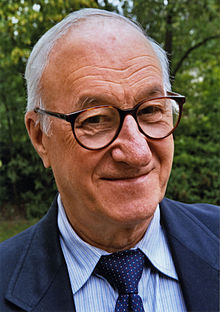STANFORD UNIVERSITY
Professor Bandura is an extraordinarily innovative scholar whose pioneering work in social cognitive theory has served as a rich resource for academics, practitioners, and policy makers alike across disciplinary lines.
His illustrative career includes groundbreaking work across a broad range of areas. His seminal research on social modeling expanded our view of human learning and the growing primacy of this mode of learning in this electronic era.
His later research on self-regulatory mechanisms laid the theoretical foundation for his theory of human agency.
These diverse programs of research blend his theoretical interests with an abiding concern for the use of our knowledge for human enlightenment and betterment.
Albert Bandura (born December 4, 1925) is a prominent psychologist, known as the originator of social learning theory and the theory of self-efficacy.
Citation: Gold Medal Award for Distinguished Lifetime Contribution to
Psychological Science, American Psychological Foundation, 2006.
Psychological Science, American Psychological Foundation, 2006.
Quotes
- Self-belief does not necessarily ensure success, but self-disbelief assuredly spawns failure.
- Bandura, Albert (1997). Self-efficacy: The exercise of control. New York: W. H. Freeman. ISBN 9780716728504. (p. 77)
- If self-efficacy is lacking, people tend to behave ineffectually, even though they know what to do.
- Albert Bandura (1982). "Self-efficacy mechanism in human agency". American Psychologist 37 (2): 122-147. ISSN 0003-066X. DOI:10.1037/0003-066X.37.2.122. (p. 127)
- Persons who have a strong sense of efficacy deploy their attention
and effort to the demands of the situation and are spurred by obstacles
to greater effort.
- Albert Bandura (1982). "Self-efficacy mechanism in human agency". American Psychologist 37 (2): 122-147. ISSN 0003-066X. DOI:10.1037/0003-066X.37.2.122. (p. 123) (appears also in Bandura's Social Foundations of Thought and Action, 1986, p. 394)

